Name: Lhakpa Sichoe
(Alias: No)
Gender: Male
Interview Age: 67
Date of Birth: 1948
Birthplace: Liktse, Utsang, Tibet
Year Left Tibet: 1961
Profession: Nomad
Monk/Nun: No
Political Prisoner: No

Interview No.: 49N
Date: 2015-04-16
Language: Tibetan
Location: Tashi Palkhiel, Pokhara, Gandaki, Nepal
Categories: Culture and History
Keywords: childhood memories, customs/traditions, houses/villages, nomadic life, refugee in India -- life as, salt trade, Utsang
Summary:
Lhakpa Sichoe was born in Liktse in Utsang Province. There were six members in the family and he was the eldest of the four siblings. His family was nomadic and herded animals like goats, sheep, horses, yaks and dri 'female yaks.' He talks about moving twice a year according to the availability of grass, but the region was large and sparsely populated with extensive areas for grazing animals.
Lhakpa Sichoe's family lived in tents. He explains how they kept their valuables, such as their Buddhist alter, in a larger tent and used a smaller tent to move around the grasslands. He also describes the community tents, which were large and used for meetings and during festivals such as the annual horse racing festival known as yardong. Nomads like Lhakpa Sichoe's family were self-sufficient and got almost everything they needed from their animals--food, clothing and shelter. They collected salt which they bartered for wheat and barley.
After the Chinese appeared in his region and they forcibly took Lhakpa Sichoe's father away to prison for refusing to serve as a transporter for them. Lhakpa Sichoe wished to take revenge and join the Chushi Gangdrug [Defend Tibet Volunteer Force], but he was too young. Eventually he was able to join the Indian Army and fought a war in Bangladesh.
Interview Team:
- Marcella Adamski (Interviewer)
- Tenzin Yangchen (Interpreter)
- Dhiraj Kafle (Videographer)

